ADAI Highlights from 2024
01/06/2025HAPPY NEW YEAR from all of us at ADAI!

ADAI had an extremely productive 2024, with tons of incredible work from our centers and teams and the development of a very exciting strategic plan that will help shape our future. As we start looking ahead, we first wanted to take a quick peek back at some of the highlights from 2024:
New Publications
ADAI faculty and staff published over 25 journal articles and reports in 2024. Find them listed on our Publications & Reports page. These publications cover a wide range of timely and important topics, including:
- HIV prevention and PrEP
- Expanding access to treatment for opioid use disorder
- Results from surveys like the WA State Permanent Supportive Housing Perceptions and Community Health Survey and the WA State Syringe Services Program Health Survey
- What we’re finding in the local drug supply through our drug checking program
- The role of stigma in criminal justice
- State requirements for non-medical US cannabis retail personnel
- Unmet needs for people using fentanyl in WA State
- Contingency management
- The role of the cannabis industry in cannabis product regulation
UW Psychiatry Symposium
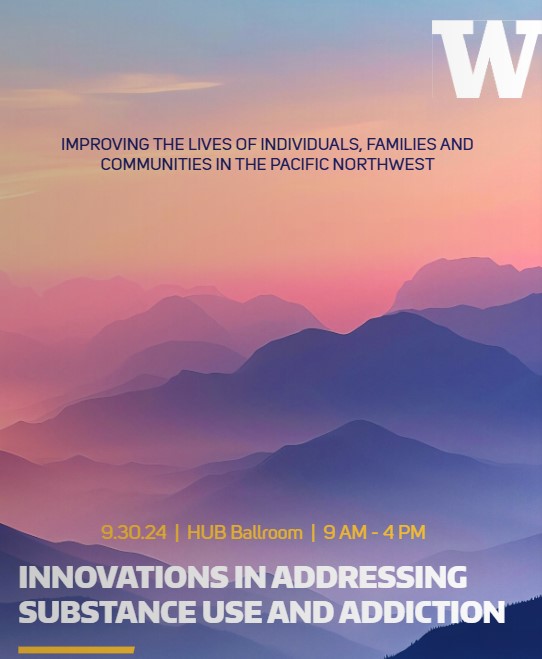
ADAI participated in the UW Department of Psychiatry & Behavioral Sciences’ first “Innovations in Addressing Substance Use and Addiction” symposium in September, a day-long event highlighting the department’s range of work in the field. Check out the companion booklet, which profiles the many programs, projects, and people in the department working to improve the lives of individuals and families who are dealing with substance use and addiction.
ADAI Small Grants
We awarded 3 ADAI Small Grants in Spring 2024, covering a wide range of topics, including GLP-1 agonists for fentanyl use, a brief substance use screening tool used in HIV care in Zimbabwe, and word learning in children with prenatal alcohol exposure. Read more about these projects here (and watch our blog for information about our Fall 2024 grantees, coming soon!).
ADAI Policy Work
During the 2024 state legislative session, two bills passed and were signed by the governor that involved ADAI. Check out a summary here. Caleb Banta-Green, PhD, MPH, MSW, the director of the Center for Community-Engaged Drug Education, Epidemiology, & Research (CEDEER), also testified to the U.S. Senate Finance Committee for a special hearing on the fentanyl crisis. The day after, US Senators Maria Cantwell, D-Wash and Bill Cassidy, R-La introduced a bipartisan bill, the Fatal Overdose Reduction Act (FORA), that would expand Dr. Banta-Green’s Health Engagement Hub model, a low-barrier opioid treatment program, nationwide. Read more about Dr. Banta-Green’s testimony and FORA here.
ADAI Director Susan Ferguson, PhD, was interviewed by the media multiple times in response to news the U.S. Drug Enforcement Administration was moving closer toward reclassifying cannabis as a less dangerous drug by lowering it from Schedule I to Schedule III. Find Dr. Ferguson’s comments here.
ADAI Center Updates
Click on the center names below to visit each group’s webpages/sites, where you can learn more about who they are and what they do!
Cannabis Education & Research Program (CERP)
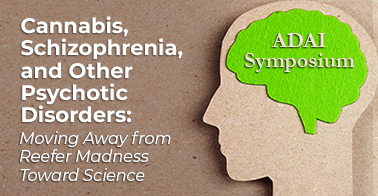
The Cannabis Education & Research Program (CERP), directed by Beatriz Carlini, PhD, MPH, hosted the first symposium in the U.S. solely dedicated to the intersection of cannabis use and psychotic disorders. Speakers included Dr. Marta DiForti from Kings College in the UK, Dr. Deepak D’Souza from Yale University School of Medicine, and a range of other national and international experts. Find the recording and slides here.
Center for Advancing Addiction Health Services (CAAHS)
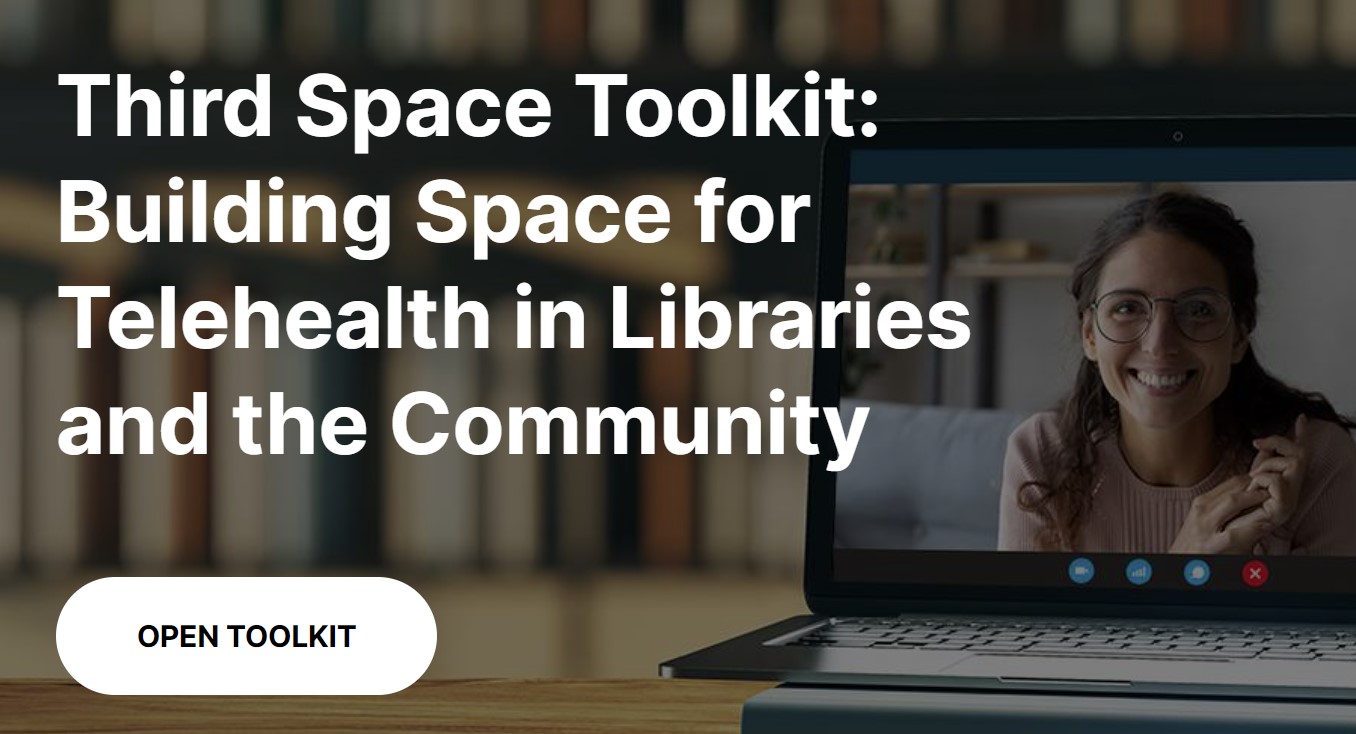
In September, the Center for Advancing Addiction Health Services (CAAHS) team, led by Bryan Hartzler, PhD, received a 5-year renewal of SAMHSA funding for the Northwest Addiction Technology Transfer Center (Northwest ATTC) to continue serving as the primary technical assistance provider to the addiction workforce in Alaska, Idaho, Oregon, & Washington. It also received 3-year funding renewals for its regional contribution to SAMHSA’s Opioid Response Network (ORN), and State Opioid Response subawards to continue providing contingency management implementation support in Oregon and Alaska. The CAAHS team also developed a new interactive educational product: Third Space Toolkit: Building Space for Telehealth in Libraries and the Community.
Center for Community-Engaged Drug Education, Epidemiology & Research (CEDEER)
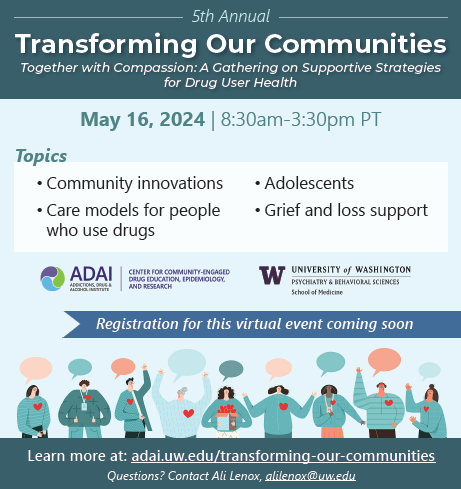
The Center for Community-Engaged Drug Education, Epidemiology, & Research (CEDEER), directed by Caleb Banta-Green, PhD, MPH, MSW, hosted their 5th Annual Transforming Our Communities event on May 16, 2024, with nearly 250 attendees. This one-day virtual event featured panel discussions on important topics around drug user health including: holistic care models for people who use drugs, grief and loss support, community innovations for field buprenorphine inductions, and fentanyl use among adolescents.
CEDEER’s Community Drug Checking Network, led by Ben Biamont, operations director, and Leif Layman, data manager, tested over 1,600 samples in 2024 and was mentioned in this New York Times article.
CEDEER’s Community-Law Enforcement Aligning in Response to Substance Use (CLEARS) Project, led by Mandy Owens, PhD, wrapped up the codesign process in four new Washington State counties (Chelan/Douglas, Grant, Kitsap, Whatcom), bringing together law enforcement, people who use drugs, and service provider to develop local solutions and got a shout-out for their work in the City of Poulsbo newsletter!
Fetal Alcohol & Drug Unit
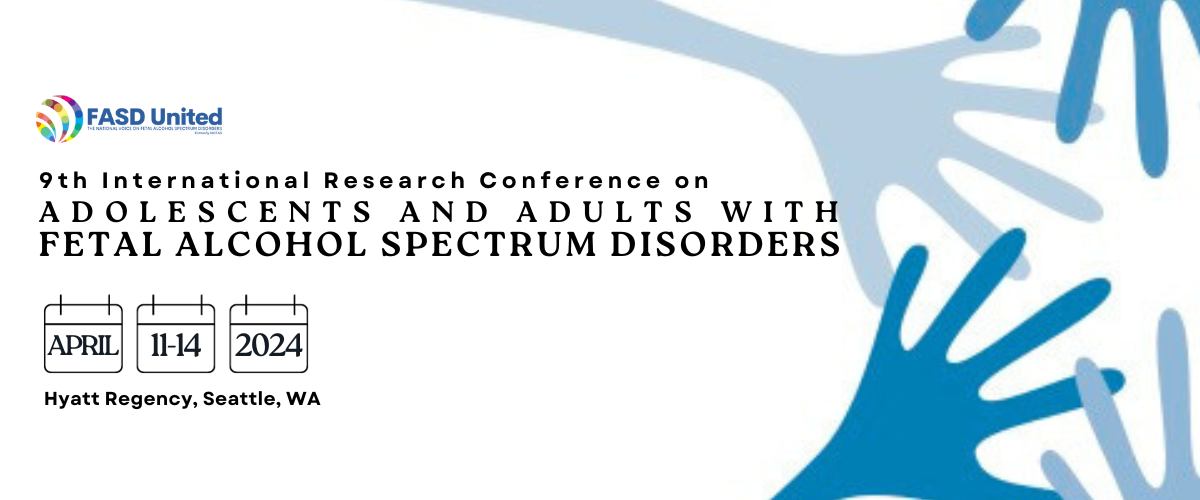
The Fetal Alcohol & Drug Unit, led by Susan Stoner, PhD, was proud to participate in the 9th Annual International Research Conference on Adolescents and Adults with fetal alcohol spectrum disorders (FASD), formerly held biannually in Vancouver, BC, and henceforth to be held in Seattle. Susan Stoner gave a plenary honoring Dr. Ann Streissguth and her seminal work on FASD, and Kay Kelly was instrumental in organizing a day long pre-conference on FASD and the justice system.
Pacific Northwest Node of the NIDA Clinical Trials Network (CTN)

The Pacific Northwest Node of the NIDA Clinical Trials Network, led by Mary Hatch, PhD, was refunded for another 5 years, published 4 research papers this year, with 4 more under review or ready for submission, and developed a new educational product for clinicians about extended-release injectable buprenorphine. The product includes short educational videos, a podcast, and factsheets intended to aid prescribers in their conversations with patients interested in these buprenorphine options.
ADAI Information Services

Meg Brunner, MLIS, and Erinn McGraw, BFA, of ADAI’s Information Services team received funding from the Network of National Libraries of Medicine (NNLM) to create the Empathy Lens collection, a set of free stock photos related to harm reduction, treatment, and recovery intended to help reduce stigma. Images from the collection will be available later this month and multiple webinars about the project are scheduled for spring 2025!
This is just a small subset of the incredible work done this year by faculty and staff at ADAI! For more accomplishments, check out the ADAI News & Events blog (sign up here to get our posts sent by email), and/or follow us on social media or subscribe to our numerous newsletters! Find out how to connect with us here.
Finally, a big THANK YOU to all our colleagues and partners at the UW and beyond. We couldn’t have done any of this without your collaboration and support! Here’s to another year of working together to advance research, policy, and practice and improve the lives of individuals and communities affected by alcohol and drug use and addiction.





